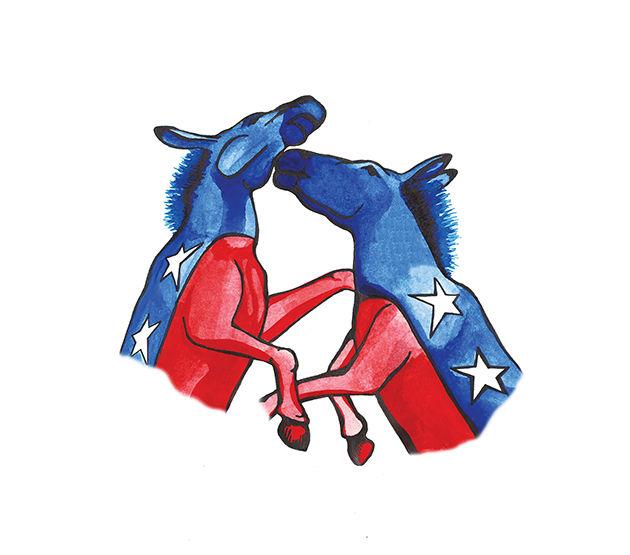The stage in Las Vegas is set with five podiums — and an extra one in the back for Joe Biden just in case — as the first Democratic primary debate approaches.
CNN will host the first in a series of six Democratic debates at 7:30 p.m. Central Time Tuesday. Anderson Cooper will moderate along with Dana Bush and Don Lemon.
Five confirmed candidates will take the stage — Hillary Clinton, Bernie Sanders, Martin O’Malley, Lincoln Chafee and Jim Webb. Whether or not Joe Biden will jump in the race is still unclear.
Geophysics senior and president of Aggie Democrats Amol Shalia said there will be some differences between the Democratic debates and the first two GOP debates that aired earlier this fall.
“I think these are two different animals we’re going to be seeing,” Shalia said. “The Republican debate at many times was a clash of personalities rather than a clash of policy. And the kinds of people who are running for president in the Democratic primary really aren’t. They don’t really seem interested in engaging in personal attacks.”
Shalia said among differing personalities, the topics will also likely be much different at the Democratic debate. Shalia said the previous two GOP debates focused on cultural and social issues, but he expects Tuesday’s debate to highlight immigration reform, climate change and college affordability.
This debate will be an opportunity for many of the lesser known candidates — Chafee, Webb and O’Malley — to establish themselves, said Kirby Goidel, a fellow at the Public Policy Research Institute and communication professor.
“Well honestly I think just walking onto the stage and being able to be seen with the other candidates is a win for those candidates,” Goidel said. “None of them are really horrible candidates if you just sort of look at their background. They’re horrible candidates because their campaigns haven’t seemed to do much of anything.”
Rebecca Yung, political science senior and vice president of Aggie Democrats, said she looks forward to the opportunity to hear more from these other candidates.
“Chaffee, Webb and O’Malley, we don’t know them,” Yung said. “So I, for one, am keeping an open mind and am perfectly willing to support one of those underdogs if they kind of speak to me at the debate.”
This debate will be the first of only six, a marked difference from the 11 GOP Debates that are currently scheduled. Goidel said this has caused some conflict in the Democratic Party because it may make things easier for front-runner Clinton.
“If you’re a front-runner in a campaign, you really don’t want to debate or you don’t want to debate too much,” Goidel said. “And the reasoning is if nothing happens, you win. So by standing on the stage with other candidates, you make yourself vulnerable. And the more you do that, the more there’s an opportunity to fall or stumble.”
Along with the fewer number of debates, the number of candidates debating is also a difference between the Democratic Debate and the GOP Debate. At the Sept. 16 GOP Debate, there were 11 candidates on stage. There are only five candidates confirmed to debate on Tuesday night. Goidel said this will change the dynamics of the debate itself.
“I think you’re going to have more confidence that you’re going to have your chance to talk,” Goidel said. “There may be less sort of this jumping in that candidates like to do. I still think they’ll do it, but there may be a little bit less pressure to jump in because you’re going to get the opportunity to respond to specific questions.”
One of the largest questions still remaining, though, is whether or not Vice President Joe Biden will decide to launch a campaign and then participate in the debate. At press time, Biden has not yet indicated a campaign, but CNN has said they will have a podium for him should he decide last minute to participate.
Goidel said it is still unclear whether or not the Vice President will join the race.
“It’s hard to read,” Goidel said. “I think partly what he wanted to do was to let some of the frustration with Hillary Clinton grow and some of the concerns about her grow and then he can step in and be the person who steps in to save the party. I just can’t get a good read on whether that’s the case or not and whether he’ll actually end up at the debate or not.”
Political science senior and chairman of Texas A&M College Republicans William Martinez said Biden will offer nothing new to the Democratic Party.
“Whether or not he runs is irrelevant,” Martinez said. “He will not bring any policy perspective that varies significantly from Clinton’s to the table. At the end of the day, we are confident that the Republican Party has the platform that best resonates with the American people.”
Paul Dutton, computer engineering junior and member of Young Americans for Liberty, agrees.
“The Democratic leaders, while perhaps more careful in foreign policy rhetoric, offer no promises of fundamentally changing Washington to serve the people without being beholden to corporate and political interests,” Dutton said. “Instead, we are offered vague policy ideas that offer to use large spending and taxation to put band-aids over modern issues, without any considerations to the causes of these problems.”










